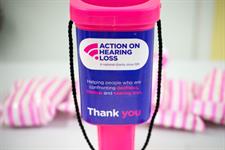Action on Hearing Loss plans to revert to its original name, the RNID, after research showed the old brand was more recognised and trusted, despite not having been used since 2011.
A new logo and branding for the hearing loss charity will be unveiled when the name change comes into effect on 2 November, the hearing loss charity has announced.
The charity was founded in 1911 as the Royal National Institute for Deaf People, but changed its name in 2011 to reflect the idea that the charity deals with all levels of hearing loss, not just deafness.
Research involving more than 6,000 people found that almost a decade after the rebrand to Action on Hearing Loss, the name RNID was still more popular than Action on Hearing Loss, which many respondents said it did not “reflect the charity’s history or communicate the amazing work it did”, the charity said in a statement.
Mark Atkinson, the charity’s chief executive, told Third Sector he was glad the charity had had the confidence to return to its original name.
“To be honest I think we have to accept that the name change to Action on Hearing Loss hasn’t worked in the way that we hoped it would,” he said.
“RNID continues to be an iconic legacy brand, it continues to have far greater awareness today even 10 years after we’ve stopped using it, so I just think there’s such a lot of equity and such a lot of support for RNID that in some ways whatever name we chose in 2011 was never going to compete.
“I’m pleased that we’ve been able to be open and honest about that with our staff and our supporters, and actually go back to what continues to be a really strong, much-loved brand.”
But, he said, he believed that “strategy trumped brand” and that the charity would still be able to ensure it engaged with people who had other forms of hearing loss, not just those who were profoundly deaf.
The new strategy and brand purpose, summarised as “Together, we will make life fully inclusive for deaf people and those with hearing loss or tinnitus”, was created through the same research.
In a statement, the charity said the focus on the daily issues deaf people have faced during the Covid-19 pandemic, such as the barriers to communication caused by face coverings, had highlighted the need to be a strong brand.
The charity has also experienced a difficult few years,with its spending outstripping income in six of the last seven financial years – a note from auditors in the accounts for the year to March 2018 warned of “material uncertainty” over the charity’s ability to continue “as a going concern”.
In the year to March 2019, its spending of £43.9m outstripped its income by £4.3m - auditors Crowe UK said it considered the charity a going concern after Atkinson and the board put in place a financial recovery plan that included reducing costs and selling its head office in Highbury and Islington, north London.
The charity has also overhauled its fundraising strategy and is due to complete the process of selling off its care services in a bid to pay off its debts and focus more on its campaigning and advisory roles in 2021.
“The charity is in a much stronger position having come very very close to running out of cash – we’re just completing our audit now, our financial position is much stronger,” Atkinson said.
He said his ambition for the charity going forward was to “create an organisation that is genuinely co-productive, not just an one that uses a 19th century paternalistic model of charity”.
He said: “I think we’ve got a lot of work to do in that respect but that is right at the heart of our strategy.”
Part of that, he said, was to ensure that more people with experience of deafness, hearing loss or tinnitus were employed by the charity.
“I think that is going to be the litmus test for our success and for many other charities,” he said.
“The deeper we get into the 21st century, quite rightly there is an expectation that charities both reflect society generally and the cause they stand for and that’s my big priority to make sure that we’re an organisation that commands the confidence of our community.”
